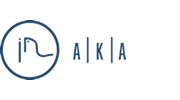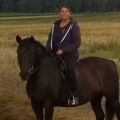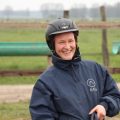REBEKKA RENNEMEYER
Question: How did you find out about the AKA and its training program for the Equine Coach?
I happened to come across AKA on the Internet, became curious and have been following all the posts on the homepage and Facebook for some time.
Question: What was your first impression of AKA when you started training?
My first impression was that all members of the AKA team have a very positive and constructive attitude, are committed to a horse-friendly, fair, and harmonious relationship and live this way. But not only the consistently positive, value-free and emphatic attitude to each horse, but also to each person, impressed me very much and made me feel very welcomed. I quickly lost my fear of doing or not being able to do something wrong. If something does not work the way I want it, it is always received with joy and seen as an opportunity to learn from it.
Question: What motivated you to take the first step?
I had been following AKA’s posts on the homepage and on Facebook and found this new form of horse training and its scientific basis exciting, but initially did not seriously consider training as an Equine Coach there. At Christmas time there was a little something to win every day on the homepage in the advent calendar and I took part in between times, until I had suddenly won two places at an information evening. The event was actually too far away and overall, it fit in time bad. But I do not believe in coincidences, but I thought there would be some reason why I won these two cards and in the end I went there.
I was impressed by Andrea’s handling of the horse, it seemed so easy and harmonious. For the first time I had the feeling that there was a coexistence between man and horse and it impressed me that the full attention of the horse after a short time was full with Andrea and it did not seem to pay attention to us spectators.
After that, I no longer had any doubt, this was exactly what I was always looking for and I absolutely wanted to become an Equine Coach and wanted to learn everything! There are no coincidences!
Question: What else do you do professionally or what is your training background?
After graduation I did a voluntary social year in psychiatry and have been working they’re now for more than 5 years in psychiatric nursing. But I always wanted to work with animals and mainly with horses, but so far I have not found the right job. My interests ranged from animal care in the zoo, to veterinary medicine (specializing in horses), horse keeping and ferrying, but none of it really felt right for me. It’s only since I began my training as an Equine Coach that I finally feel like I have found exactly the right path for me.
Question: Do you have your own horses, if yes, which ones?
Yes, I have 2 Shetland ponies.
Question: What is your riding background (recreational riding, dressage etc)?
At the age of 6 I started practicing vaulting. At the age of 9 I was allowed to take my first riding lesson and rode for about 6 years. But I had more and more often felt that the horses working with us humans makes little fun, I had lost more and more of the desire for riding and was almost through. For me at that time unrecognizable situations were more uncertain in dealing with horses.
Nevertheless, I had always had contact with horses with short breaks, had riding and care participations, until I finally got my first own Shetland pony. I’ve started to teach her many things through clicker training because I wanted her to have mostly positive and enjoyable experiences, and therefore enjoy training. There were quick successes, and the first tricks were learned quickly. However, she quickly became angry and aggressive when she did not immediately know what she should do to get the treat. She started begging and tweaking in her pockets (or arms and legs), which quickly became a general behavior. I did not feel that she had fun training with me, but just wanted to have her carrot and was very food oriented overall. But I did not find an alternative at that time and did not know what could be adequate rewards that would make sense to her, how I could explain her in a different way, what I wanted from her and that she also enjoyed training.
Question: What sets AKA apart in the worldwide horse industry?
Through the scientifically based and provable knowledge and the associated certainty to communicate with horses from a horse-centric perspective. The willingness to try out new ways, to question oneself, to continue to learn, to continuously develop EBEC and to always be up to date with the latest state-of-the-art, state-of-the-art horse training.
Question: How did AKA support a difference in your life and how did it change it?
I have become more “benevolent” and relaxed in my contact with humans as well as with animals. I no longer have such rigid, partly unattainable expectations of my counterpart and give him (human and animal) the chance to do things right. It is now easier for me to look at the world through the eyes of others and to react emphatically. I have learned to handle criticism much better, questioning myself and my actions much more often. As a result, the handling of horses (and animals in general) and people has become carefree and satisfying.
Question: What does it take to be part of AKA?
The willingness to enter into a dialogue with the horse, to meet it at “eye level”, to perceive it as an equal being with its own feelings and to want to achieve the goals set TOGETHER. If you are there with body and soul, everything else develops naturally in the course of the training.
Question: To what extent does the AKA also live traditional disciplines and concepts of the horse industry? Can EBEC also be integrated on the saddle for all equestrian disciplines?
Since EBEC has been developed with the help of scientific knowledge about the natural behavior, the brain and the instincts of the horse is always clearly understandable and meaningful for the horse, it is in every equestrian discipline, in the saddle, from the ground or the coach Applicable and viable.
Question: What do you love most about the AKA?
The joy and enthusiasm with which we all learn together more and more about horses, but also about ourselves, the positive, benevolent attitude and, above all, the feeling that we have finally arrived and found the right path.
Question: What would you like to share with people who are now learning about evidence based equine communication through our website?
At the beginning, I could not imagine all the things I am writing here myself and I thought “EBEC is not just a training method, it is a lifestyle” is a very nice sounding phrase, but that it actually did change something in my life, seemed unrealistic to me. In the meantime, however, I have been able to experience that it is not just lullabies, but that training as an Equine Coach is an unending process of development, change, and rediscovery.
It is a lot of fun to see how much joy and commitment the horses are learning, more and more curious, trying out, trusting (learning) and willing to do the most for us when they are trained with EBEC.
Question: And something else?
Many things in dealing with horses were self-evident for me and I have considered them natural. But I’ve learned that nothing that horses do with and for us is natural and natural for an animal of escape, but a foundation of mutual understanding and trust makes almost everything possible.
Horses show us that it’s the little things that make big changes. EBEC helps us to perceive, understand, and implement them.
Question: What ambitions do you have in your work or for your future with horses?
I want to contribute to making life in our equestrian world fair and beautiful for horses.





